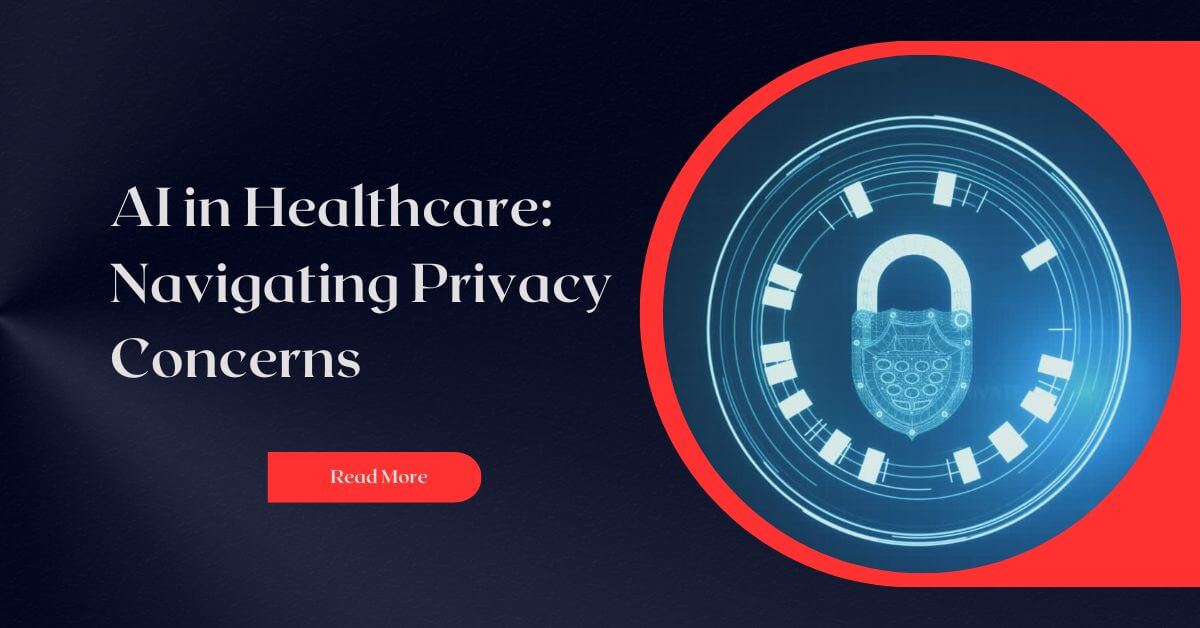When I think about privacy concerns with AI in healthcare, I worry about my personal health info. Will it stay safe, or could it get into the wrong hands? These worries keep me up at night, and I’m not the only one.
AI in healthcare could change how we get care. It could offer personalized treatments and catch diseases early. But, there are big privacy concerns that need to be addressed. We’ll look at these risks, the rules that apply, and the ethics of AI in healthcare. This will help you understand your data and the future of AI in healthcare.
Privacy Concerns with AI in Healthcare
Key Takeaways
- Understand the privacy risks associated with the integration of AI in healthcare, including data privacy, patient confidentiality, and algorithmic bias.
- Explore the regulatory landscape and HIPAA compliance requirements for healthcare organizations using AI-powered systems.
- Discover the security challenges and cybersecurity threats posed by AI-powered healthcare systems.
- Learn about consent management, data governance, and the importance of transparency in AI for healthcare.
- Gain insights into the ethical considerations and best practices for responsible AI development in the healthcare sector.
Understanding the Privacy Risks of AI in Healthcare
The healthcare world is turning to artificial intelligence (AI) to make things better and care for patients more. But, we must talk about the privacy risks that come with it. Keeping data privacy and patient confidentiality safe is key when using AI in medicine.
Data Privacy and Patient Confidentiality
Healthcare data is very personal, with details like medical history and treatment plans. AI brings a new risk of data privacy breaches. This could mean sensitive info getting out or being used the wrong way. It’s vital to have strong data protection and security to keep patient confidentiality safe and keep trust in healthcare.
AI Ethics and Algorithmic Bias
AI in healthcare also raises big ethical questions. Algorithmic bias can cause unfair treatment, leading to unequal care and outcomes. Healthcare must tackle these AI ethics issues to make sure AI systems are fair, open, and answerable.
By facing and fixing the privacy risks of AI in healthcare, we can use this powerful tech. We can do it while keeping patient trust and protecting their medical information.
Regulatory Landscape: HIPAA Compliance and Beyond
The healthcare industry is quickly adopting artificial intelligence (AI). This change makes the rules for protecting patient data more important. The Health Insurance Portability and Accountability Act (HIPAA) is at the center of these rules.
Healthcare groups using AI must follow HIPAA compliance rules. They need strong data governance to protect patient information. Good data governance helps them follow rules and use AI responsibly.
But HIPAA is not the only rule. Healthcare groups also need to think about laws like the California Consumer Privacy Act (CCPA) and the European Union’s General Data Protection Regulation (GDPR). Keeping up with these laws is key for healthcare leaders as they use AI.
| Regulation | Key Focus | Geographical Scope |
|---|---|---|
| HIPAA | Patient data privacy and security | United States |
| CCPA | Consumer data privacy rights | California, United States |
| GDPR | Data protection and privacy for individuals in the European Union | European Union |
Healthcare groups can use AI’s power to keep patient data safe. This careful balance is key for trust, following rules, and using AI well in healthcare.
Privacy Concerns with AI in Healthcare
The healthcare industry is turning to artificial intelligence (AI) more and more. But, this raises big questions about keeping patient data private. Healthcare data is very personal and private, and using AI makes us wonder if it’s safe.
AI algorithms might accidentally share patient data. They could find patterns that show personal info, even if the data was made anonymous. This could make patients lose trust in their doctors and the healthcare system.
- The challenge of getting patients to agree to AI use because it’s complex and hard to understand.
- The a need for strong data management and access controls to keep sensitive info safe.
- The risk that AI could reveal private health details, genetic info, or lifestyle choices.
It’s vital to tackle these privacy concerns with AI in healthcare to keep trust. Healthcare groups must focus on keeping data safe while using AI to help patients and make things run smoother.
Security Challenges in AI-Powered Healthcare Systems
Healthcare is turning to artificial intelligence (AI) more and more. But, this brings new security challenges. AI in healthcare means we need strong cybersecurity to protect against risks.
Cybersecurity Threats and Vulnerabilities
Data breaches are a big worry. AI systems with patient info, like EHRs and medical images, are at risk. Hackers could steal or misuse this data, hurting patient privacy and trust.
AI healthcare systems also face threats like ransomware. This is when hackers demand money to return patient data. Such attacks can stop important medical services and risk patient care, harming healthcare organizations.
- Data breaches and unauthorized access to patient records
- Ransomware attacks that disrupt medical services
- Vulnerabilities in AI-powered medical devices and systems
To fight these security risks, healthcare needs strong security steps. This includes safe data storage, access controls, and watchful monitoring. IT security teams and healthcare experts must work together to protect patient data and stay safe from new threats.
Cybersecurity Threats
A dark, futuristic healthcare facility with glowing digital interfaces, surrounded by ominous shadows representing unseen cyber threats; a network of interconnected medical devices displaying warning signals, binary code cascading down surfaces, and a central monitor showing a security breach alert, all under a moody, high-tech atmosphere.
Consent Management and Data Governance
In today’s AI-powered healthcare, managing patient consent and data governance is key. Consent management means getting patients’ informed consent. It ensures they know how their data will be used and protected. This builds trust and keeps AI healthcare ethical.
Data governance deals with managing sensitive medical info. It includes policies and technologies for data collection, storage, and access. A strong data governance framework helps follow privacy laws like HIPAA and avoid data breaches.
- Implement clear and transparent consent processes, allowing patients to understand and control how their data is used.
- Establish comprehensive data governance policies that outline data collection, storage, and access protocols.
- Leverage technology solutions, such as consent management platforms and data access controls, to streamline consent management and data governance.
- Regularly review and update consent and data governance policies to address evolving privacy concerns and regulatory requirements.
- Foster a culture of data stewardship within the healthcare organization, where all employees understand and uphold data privacy and security protocols.
By focusing on consent management and data governance, healthcare can gain patient trust. It also ensures privacy laws are followed and keeps medical info safe in the AI era.
Fostering Transparency in AI for Healthcare
The healthcare world is moving fast towards AI. Patients and doctors must understand how these systems work. This is why explainable AI and interpretability are so important.
Explainable AI and Interpretability
Explainable AI means AI can explain its decisions clearly. In healthcare, this is vital. It helps doctors and patients make smart choices and feel in control.
Interpretability makes AI’s inner workings clear. This lets doctors trust AI’s advice more. It helps improve care and builds trust.
| Key Aspects of Transparency in AI for Healthcare | Benefits |
|---|---|
| Explainable AI | Enables healthcare professionals and patients to understand the reasoning behind the AI’s recommendations, leading to informed decision-making and increased trust. |
| Interpretable Algorithms | Allows healthcare providers to assess the reliability and trustworthiness of the AI system, improving patient outcomes and fostering a culture of trust. |
Healthcare groups focusing on transparency in AI can use these technologies wisely. They keep patients and doctors in charge. This balance is key for AI’s success in healthcare.
Transparency in AI
Best Practices for Privacy-Preserving AI in Healthcare
The healthcare industry is using privacy-preserving AI more and more. It’s important to follow best practices to keep patient privacy and data safe. These steps help healthcare groups use AI’s power while keeping medical info safe.
Data anonymization is a key practice. Healthcare providers need to make patient data anonymous. This means removing any info that could identify a person before using it in AI. This way, they can still get useful insights without sharing personal info.
- Use strong data anonymization methods like data masking and differential privacy.
- Check and update anonymization methods often to keep them secure.
Keeping data safe and who can access it is also vital. Healthcare groups must protect patient data well. This includes:
- Using encrypted data storage.
- Limiting who can see data to only those who need it.
- Watching data access closely to catch any unauthorized use.
Keeping an eye on risks is another important part of privacy-preserving AI in healthcare. Healthcare providers need to find and fix privacy and security risks. This means:
- Doing regular privacy impact assessments.
- Having strong plans for dealing with data breaches.
- Keeping up with new rules and best practices.
By following these best practices, healthcare groups can use privacy-preserving AI safely. This way, they can help patients while keeping their trust.
Ethical Considerations and Responsible AI Development
The healthcare industry is turning to AI more and more. It’s important to think about the ethics of this technology. AI in healthcare needs to be developed and used carefully. This ensures accountability, transparency, and fairness.
These values are key to keeping patient trust. They also help the medical field stay ethical.
Accountability and Fairness in AI Systems
Healthcare groups must make sure their AI systems are fair and accountable. They need strong rules to watch over AI development and use. It’s important to check AI for biases and fix them.
This way, patient care isn’t affected by things like race or gender. It’s all about making sure everyone gets the same chance.
It’s vital to focus on ai ethics and responsible AI development. Healthcare providers need to put accountability and fairness in ai systems first. This keeps patient trust and the industry’s integrity strong.
| Key Considerations | Strategies for Responsible AI Development |
|---|---|
| Algorithmic Bias | Regularly audit AI models for potential biases and take corrective actions. |
| Transparency and Explainability | Implement explainable AI techniques to ensure the decision-making process of AI models is transparent and understandable. |
| Ethical Governance | Establish multidisciplinary ethical review boards to oversee the development and deployment of AI in healthcare. |
By focusing on ai ethics, accountability, and fairness in AI systems, healthcare can use AI wisely. This way, patient trust, and the medical field’s integrity stay strong.
Conclusion
AI in healthcare has huge potential but also raises big privacy worries. It deals with data privacy, keeping patient info safe, and making sure AI is fair. The healthcare world must carefully follow rules to use AI wisely.
Keeping patient data safe is key. Healthcare teams need to handle cybersecurity, get consent, and manage data well. Being open about how AI works helps build trust with patients.
For AI to work well in healthcare, everyone must work together. This includes doctors, tech companies, lawmakers, and patients. By focusing on ethics and safe AI use, we can use AI’s power while keeping patient data safe.


